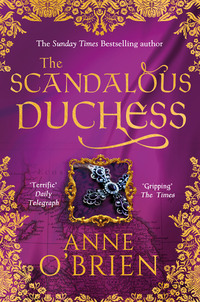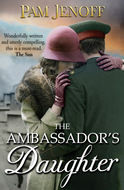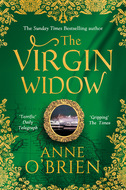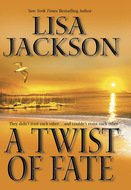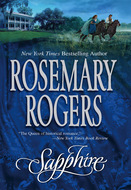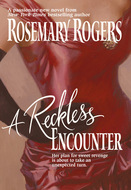Kitap dosya olarak indirilemez ancak uygulamamız üzerinden veya online olarak web sitemizden okunabilir.
Kitabı oku: «The Scandalous Duchess», sayfa 2
Which was inexplicable. Was he mocking me? I bridled.
‘I see nothing to laugh at,’ I remarked coldly.
On which he stopped to draw in a breath, his eyes still gleaming with whatever it was that had moved him to a show of mirth.
‘You have a way with words, Lady Katherine.’
‘Because I said no?’
‘Exactly. I could not possibly mistake your sentiments, could I?’ He seized my hand again, and before I could stop him, saluted my fingers with a perfect propriety, at the same time as he executed a courtly bow.
‘I will have to make do with that after all,’ he observed, running his thumb across my fingertips.
‘And that is all I will offer you, my lord,’ I responded. That my hand tingled was not to be considered.
The Duke laughed again, but briefly. Whatever humour he had discovered in my predicament, or his own, had fled.
‘It seems that I have been too previous in my request. Now it is my turn to ask pardon. Forgive my insensitivity.’ He paused, his expression grave, the tendons of his jaw stark. And then a gleam appeared in his eye as he added: ‘But I should warn you, Lady Katherine. I will not be denied. It is not in my nature to accept so determined a rebuttal.’
And as he strode from the audience chamber, as his footsteps faded, as he crossed the antechamber beyond and took the stairs to the upper floor, I was left to wonder if I had imagined the whole unnerving incident. But when I heard his final parting shot, delivered to me and echoing from the well of the stairs, there could be no denying his meaning. There was no misinterpretation on my part of the whole of that inexplicable episode. His final words, which had floated back to me as clearly as if he had been standing in the room, had been quite as unambiguous as all the rest.
I sank down where he had left me, onto a stool that had been pushed with its companion against one of the walls. Hands clasped together, so tightly that my knuckles showed white against my dark skirts, I stared at the tapestry on the facing wall, a masterpiece in silk and wool.
Of all the tapestries in the superbly appointed Savoy palace, why did it have to be this one, with its frivolous portrayal of courtly love, a lady and her lover languishing in a field of blossoms beneath a flowering tree, while silky rabbits frolicked at their feet. He held a hawk on his fist; her arms were entwined around his neck, her hair mingling with his as he reclined in her arms. His stitched eyes were admiring; her red lips were full of longing. I imagined they were not wed, or in any way concerned about the sinfulness of their relationship. They looked untrammelled by any pious demands on their virtuous behaviour.
‘I wager you would share your lover’s bed without any holy water sprinkled over you,’ I informed the red-haired wanton, crossly.
I thought that she smirked as I imagined her reply. ‘And would you be prepared to languish in the arms of a lover, Katherine de Swynford?’
I most certainly would not. I was no Alice Perrers, infamous royal mistress, who shared the King’s bed with bold impunity, careless of the vilification. My behaviour must be beyond criticism. I must be able to kneel at my prie-dieu or before my priest with a clean heart. How could the Duke have so demeaned himself, and me, to offer me such an outrageous position? I was no wanton.
I want to kiss you.
He had had the temerity to make such a request of me, clad as I was in full widow’s weeds from chin to toe to indicate my deepest mourning. If my dark robes had not heralded my state to the whole world, the all-enclosing wimple and long veil should have been as obvious as a slap in the face to any man with ulterior motives. I was no loose harlot, willing to accept any position offered at court to secure my future comforts.
Flexing my fingers, I smoothed the black cloth over my knees. Hugh had been dead so short a time, struck down in the Duke’s own service in Aquitaine. Did the Duke think I would soil my husband’s memory by leaping into his bed—or that of any man—at the first opportunity? I could not comprehend any action of mine in the past to give him the opinion that I would care so little for my reputation, or for God’s judgement on what would be a blatant act of adultery.
Adultery.
The harsh judgement shivered over me and as my outrage built, I pondered all I knew of the Duke. A prince with a reputation for high-minded courtesy and chivalry, he had adored his first wife, Blanche, and was plunged into desolation by her untimely death three years before. He would never have strayed from her side. And now he had a new wife, a marriage of three months’ standing, and the prospect of a new child and a new kingdom to rule if he could enforce Constanza’s claim to Castile in his own right. A man of ambition, the Duke would do nothing to jeopardise the authority in that distant kingdom if he wore its crown. He would not take a mistress within three months of bedding a new wife.
It was all beyond sense. The Duke of Lancaster was not the mindlessly pretty, disreputable young man of the tapestry whose sole concern was dalliance.
And yet, at the same time I was forced to acknowledge that the puissant Duke of Lancaster, raised in royal indulgence from his cradle, was the possessor of a will as strong as cold steel. I will not be denied, he had said. It is not in my nature to accept so determined a rebuttal.
It was an uncomfortable thought.
And my next proved to be an even more disconcerting companion.
Was the fault mine? Had I, however inadvertently, however cleverly cautious I had considered myself to be, encouraged the Duke to think that I would welcome so impious a request? I could not imagine that I had dropped so careless a word, made so flirtatious a gesture, just as I was certain that I had never led him to believe that I would step so far beyond seemly behaviour. Inappropriate desires and longings, even if I had them, were to be held under restraint and confessed only before the priest.
I cast my mind back over the three years since I had left the household on Duchess Blanche’s death, when we had all been deluged in mourning black, overwrought with grief. The only occasion on which I had seen the Duke was two years ago at the interment of Queen Philippa in Westminster Abbey, when he had pinned a mourning brooch to my bodice. Hardly an occasion for unseemly flirtation.
So perhaps I had misconstrued the whole of the past hour, making my present tumbling concerns entirely irrelevant. But of course, I had not misconstrued it. I would have been witless to put a wrong interpretation on his parting shot
And I don’t like you in widow’s weeds, he had informed me from a distance. They don’t become you. If I were your lover I would clothe you in silk and cloth of gold.
No, I was under no delusion about that: so intimate, so personal a comment on how I looked, what I wore and how he would remedy it. What right had he, when custom demanded that I wear mourning for a year? Vanity—assuredly a sin—lit a little flame of anger, as I spread out my skirts, disliking the weight of them in the voluminous amount of material, fretting that my wimple and veils leached colour from my skin. I knew I did not look my best, and was woman enough to regret it.
But how dare he remark on it?
And why had he laughed at my refusal?
I was furiously unsettled, for my future was still dependent on the Duke. He had not yet made an answer to my request. Had he changed his mind entirely in the face of my flat rejection?
With a swish of my hated widow’s weeds I turned my back on the couple deliriously in love, wishing the smug lover buried under his blossoms, and strode off to return to normality and the company of those I knew, a household for whom I had a deep affection. A good bout of common sense and feminine gossip would do the trick. As for the lovers, the cunning rabbits would soon eat up the blossoms—and then where would they be?
I made my way to the royal nurseries.
Feeling an urge to knock on a door that I would once have walked through without a second thought, I resisted. Opening it, I walked through. How familiar the scene was: nurse and chambermaid, governess and damsel and sempstress, all intent on the burden of care of the three precious Lancaster children. Once as damsel to Duchess Blanche I had been one of this number, and would wish to be so again. There, at their lessons, were three little girls, two of them with royal blood, all much grown since I last set eyes on them: the ducal daughters, Philippa and Elizabeth at eleven and eight years, eyes trained seriously on their psalters—although it had to be said that Philippa showed more concentration than her sister who cradled a tabby kitten on her lap—while Henry—how he had grown!—all of four years old now, stood at the side of a lady who was engaged in explaining to him the illustrations in a book. And then there was the third little girl, whose age I knew precisely…
For a moment I simply stood and watched the scene in all its busyness, my heart so overburdened with love that tears welled. It had been an emotional day, one way or another. I swallowed and took another step.
‘Good day, my lady.’
I curtsied.
The lady with the book looked up, expression arrested between irritation and then gradual recognition. The book was slowly closed and placed out of Henry’s reach. The lady exhaled slowly.
‘Katherine, as I live and breathe…’
Which caused me to smile, it being a well-recognised expression on Lady Alice’s lips, whilst Alyne, wife of Edward Gerberge, one of the Duke’s squires, surged across the room towards me. It brought all eyes to my face in a mix of pleasure and curiosity. Philippa smiled. Elizabeth barely remembered me, Henry certainly did not. As for the other child…
My eyes on the little girl’s bright face, I curtsied again to Lady Alice. ‘My lady, forgive my intrusion.’
‘Nonsense!’
Lady Alice was on her feet, and then I was enclosed in female arms, patted and fussed over, Alyne relieving me of my cloak and gloves, before both found the words to commiserate.
‘I recall the day you were wed,’ Lady Alice said and sighed. ‘Hugh was a good man—and I expect a good husband to you. But for the wife of a professional soldier, life can be very difficult.’
And I found that, prompted by such solicitous expressions, I was weeping at last, for Hugh and for myself.
‘Forgive me, Lady Alice…’ I could not seem to stop the tears falling endlessly, all the tears I had been unable to shed.
Alice FitzAlan, Lady Wake, merely poured a cup of ale and, as Alyne wiped away my tears, pushed me to sit in her own chair, handed me the ale and dissuaded Henry, gently but deliberately, from climbing into my lap.
At last I laughed and sniffed, but my eyes were for the third little girl who had come to stand at my knee, her hand now grasping my skirts. She was seven years old, almost eight now. I knew exactly, for this was Blanche, my eldest daughter, honoured with the position of damsel to the Duke’s daughters. My lovely Blanche, named for the Duchess in whose service I had been when she was born.
Abandoning the cup of ale, I swept her up in my arms and kissed her.
‘My daughter,’ I said, touching her face. ‘My little Blanche—not so little now. Have you forgotten me?’
For a moment she hesitated, as if reflecting on the matter in her solemn way, then Blanche buried her face against my neck. My tears threatened to begin all over again.
‘She is a credit to you,’ Lady Alice remarked in her cool manner.
‘One day she will marry well,’ Alyne added. ‘She is very pretty, like her mother.’
I took Blanche’s face between my hands, kissing her cheeks, tucking away her curls beneath her linen cap. It was true she looked like me. Her hair was the same rich burnished gold as mine, the colour of autumn wheat ripened under a hot sun, but her features still had the soft unformed edges of childhood.
‘And can you read and write yet?’ I asked her.
‘Yes, madam,’ she replied with quaint confidence. Then reached up to whisper in my ear: ‘Better than the Lady Elizabeth. She does not try. She likes the kitten more.’
For a moment it surprised me, that Hugh’s death seemed not to have touched her to any degree, but then she has seen so little of him in her short life. She would barely recall him, and on this day of our happy reunion I would not burden her with his death.
‘Damsels should not tell tales about their mistresses,’ I whispered back.
‘I know that!’ she replied, her clear voice ringing out. ‘But it is true. It is not a secret.’
I hid my smile
‘Is that true, Elizabeth?’ I asked. ‘That you do not work hard at your lessons?’
Elizabeth considered me. ‘Sometimes I do. I have learned to dance and sing.’ There was a roguish twinkle in her eye—when had she acquired that? And she promptly demonstrated by tucking the kitten under her arm and executing a succession of childishly uncoordinated steps across the room to my side. But one day she would be elegant.
‘And you, Philippa?’ I asked.
‘I always do my best,’ she assured me, smiling so that her face lit as if with a candle within. She would be beautiful one day. ‘You are right welcome, Lady Katherine. We have missed you here. If you returned to us, Elizabeth would mind her books again.’
I laughed, all my tears and previous anger forgotten. I had come home. It was good to laugh again
‘Will you return to us?’ Alyne asked. ‘Now that you are alone?’
‘I had hoped so,’ I replied uncertainly.
‘Have you spoken with Lord John?’ Lady Alice asked.
‘Yes.’ I could feel my cheeks heat, and attempted to hide it by kissing Blanche’s still-escaping curls.
‘The income from Kettlethorpe was never great,’ Lady Alice mused.
‘No, and it’s no better now,’ I admitted with a sigh. ‘And without Hugh’s soldiering…’
‘Lord John will be generous.’ Lady Alice patted my hand as if I were one of her charges.
I was not so sure. I had refused what he had offered me, out of hand, generous or no. And if my present companions knew what that offer had been, they would not now be welcoming me back like a long-lost sister. Lady Alice, governess to the ducal children, was cousin to the Duke and a lady of high principle, strong on morality, firm on good manners. I suspected that she would banish me from the room, if not from The Savoy.
It behoved me to keep my own council.
Chapter Two 
There was a commotion at the door, an exchange of words in male accents, and then the Duke entered the chamber where, on the morning following my arrival at The Savoy, the children learned their catechism, Lady Alice cast her eagle eye over all and I stitched at a length of linen in the window embrasure. His immediate awareness of me, conspicuous in his glance alighting on my face, made my belly clench and my heart thump beneath the mourning black that he did not like. It was in my cowardly mind to keep my eye on my work, as if stitching the border of an altar cloth would save me from humiliation.
Would he offer me the position I needed? Or would he continue to pursue the startling proposal of the previous day?
Not in public, he won’t, I castigated myself. You are a fool, Katherine!
And indeed there was no need for my fears for it became self-evident, as his regard moved rapidly on from me to the other occupants of the room, that my worries were not his priority.
This morning there were matters of higher business to attend to. The Duke was uncharacteristically brusque, with a line between his brows, even though he found time to smile at the children, kiss the cheek of Philippa and Elizabeth and brush his hand over Henry’s already tousled hair. The smile was, it had to be said, a bleak affair. I rose to my feet, putting aside the sewing, and, with Lady Alice and Alyne, made the requisite curtsy.
‘I will be away.’ His attention was for Lady Alice. ‘I leave the children in your care, Alice, as ever.’
He was dressed for travel in wool and leather, the metal plates of his brigandine masked in fine velvet. In such a garment he was not travelling far.
‘Is it bad news, John?’ Lady Alice asked.
‘It could be better.’ It was impossible to mistake the grimace. ‘My brother Edward’s health does not improve and the King is…’ The Duke shrugged.
We all knew of this terrible cause for concern. The Prince, heir to the throne and with a reputation second to none on the battlefield, was come home from affairs in Aquitaine, gravely ill, and his son, Richard, no older than Henry. Lionel, the King’s second son, was dead in Antwerp these last three years. King Edward’s own powers had waned in the months since Queen Philippa’s death. Suddenly the smooth security of the royal inheritance was under attack: it was not a good prospect for England to have both King and heir ailing and the future king so small a child. Which left the Duke in a delicate situation.
Some said he had his own ambitions for the English crown, for no man of sense would place a wager on the longevity of either the King or the Prince. If the worse came to the worst, better an able man at thirty-two years and in his prime to wear the crown than a child of fewer years than fingers of one hand.
Looking at him now, at the authority inherent in his stance from his ordered hair to the fine leather of his boots, I wondered where his ambitions did lie. I did not know.
‘The situation in Aquitaine and Gascony rests on a knife-edge,’ he continued, as if picking up my thoughts. ‘The progress of the English troops, without direct leadership—it’s not good. I’m going to Kennington to talk with the Prince. I’ll need to stay if it’s decided that I lead an expedition. We badly need a victory against France, and it may be that Parliament must be summoned to finance such a lengthy campaign. It will not be popular, even though a victory’s in everyone’s mind…’
He was already moving towards the door, as if the burden of these decisions was driving him into action.
‘I’ll send word when I know my future movements.’
So, after shaking my world into disorder, he would leave without making any decision about me. My mind leaped crossly with indecision.
I really need to know where I stand.
It is not appropriate for you to trouble him with your inconsequential needs when the government of England rests on his shoulders.
I followed him to the door.
‘My lord?’
He turned his head, his hand on the latch.
‘Lady Katherine.’ Impatient to be gone, yet as he took in my appearance not without a glint in his eye. ‘Still garbed like a winter raven, I see.’
‘And, as a widow, will continue to be until the year of my mourning is ended,’ I replied tartly.
‘As you will, lady.’
Oh, he was preoccupied, and I bristled beneath my widow’s black. If the royal duke had been suffering yesterday from a blast of inappropriate lust for my person, it had been a remarkably short-lived one. Which was hardly flattering to me.
‘Lady Katherine…?’ His brows flattened. ‘My time is precious.’
So I asked him one question. The one question that had troubled me, to which I needed to have the answer. Not why he had impugned my honour. Not if he would consider a position for me—a respectable position—in the household of his new duchess, or even an inferior position in one of his other establishments. But the question that had teased my female interest.
‘My lord, why did you laugh at me yesterday? Was it all a piece of mockery?’
For if he had been amused, perhaps his intent had been to disconcert me, simply to see what a respectable widow, given the chance to become an unrespectable whore, would say. I could not believe him guilty of such dishonour, yet there had to be a reason that I could not see.
‘Did my discomfiture amuse you?’ I repeated.
He seemed to consider this for an inordinate length of time. Then, when his stare had disconcerted me so that my cheeks were flushed the pink of summer eglantine: ‘Amuse me?’ He shook his head, his mouth settling in a wry twist. ‘I was not amused at all.’ There was no laughter in him today, rather a lick of temper.
‘You laughed at me, my lord.’
‘Then I must ask your pardon, Lady Katherine.’ It did not sound like an apology. ‘If it was laughter, it was because it seemed to me impossible that it should happen twice in a lifetime.’
‘What should? What should not happen twice?’ I asked, as confused as ever, refusing to be intimidated by that penetrating regard.
His hand fell from the latch and he turned to face me fully as he lowered his voice. At least he had the consideration to do that.
‘That the woman at whose feet I would kneel in knightly adoration should refuse me outright.’
‘My lord…!’
I simply did not know how to respond as, cursed with fair skin, my face flamed even brighter. I was saved from further embarrassment only when William Parr pushed open the door to appear behind the Duke’s shoulder.
‘Your escort is ready, my lord,’ the squire advised.
‘One moment, if you will.’
But Will Parr, well used to the Duke’s manner, persisted. ‘Forgive me, my lord. A message has just been delivered, that the King too will travel to Kennington. He requests that you accompany him.’
‘Of course. I’ll come now.’
He held out his hand to me, the jewels stitched on the cuff of his glove glinting, leaving me with no response but to put my hand there on the costly leather. With a curt little bow, he touched his lips to my fingers.
‘It would be unforgivable of me to make you an object of mockery, Madame de Swynford. What it would please me to do is to put the light back into your eyes.’
And then I was left staring at his back.
He had made no decision on my future at all, and I had not asked him. How could I when he had clearly pushed me to the back of his busy mind? It might be a superbly romantic conception to serve me unto death, but only when the Duke considered that he had the time to encompass it.
We took the children to watch the departure from the steps that led down from the Great Hall into the inner courtyard. Since the Duke would travel by road to Westminster and then on from there to the Prince’s palace at Kennington south of the Thames, rather than travelling by river the whole way, the great portcullis had been raised. The gates were opened and the courtyard thronged with horses and liveried servants in the Lancaster colours of blue and white. I lifted Henry in my arms so that he could see the Duke swing into the saddle of his favourite bay stallion. The escort fell into formation.
Without doubt, even his critics must acknowledge that he was superb, that he wore the power that had been his from birth with smooth ownership, as elegantly as he wore the livery chain on his breast, and just as arrogantly, as now, when he raised his chin, lifting his hand in a peremptory gesture to summon one of his henchmen who moved smartly to obey. Too arrogant for many. The Duke made as many enemies as friends.
‘Did Duchess Blanche refuse to wed Lord John?’ I asked Lady Alice. It was time that I sought enlightenment from the best source. She would know, as a cousin to both the Duke and Blanche of Lancaster. I thought my query innocuous enough.
‘So they say.’ Lady Alice glanced in my direction but without suspicion.
‘I did not know. I was too young, I suppose.’
I had been sent, by Queen Philippa, to take up a position in Duchess Blanche’s household in the months following her marriage to the Duke, when I was barely ten years old. If there had been gossip, I had not understood the implications.
A blast of the horn from John Tyas, the herald suitably puffed-up in Lancaster livery, a nod from the Duke and they rode out, stillness finally settling round us. So Blanche had initially repulsed him. But the Duke had obviously refused to take no for an answer from the woman he had loved. He had persisted, wooed her and won her.
But why had he placed me beside Duchess Blanche? He clearly did not love me in the same overwhelming manner. Lust, perhaps. Were not all men subject to bouts of uncontrolled desire?
‘Why would any woman refuse to wed him?’ Lady Alice mused, picking up the conversation as if there had been no hiatus—something she often did. ‘It seems to me that he has every prerequisite for a husband. Exceptional features, grace, nobility, courtesy…as well as wealth and royal blood and all that implies.’ There appeared the faintest sneer on her lips. ‘Constanza of Castile was quick to take up the offer.’
‘So why did she?’
‘Because Constanza wants the Duke to win back Castile for her and—’
‘Not Constanza. Why did Lady Blanche refuse?’
‘Who’s to say?’ Lady Alice grasped Elizabeth’s hand, to prevent an attempt at escape. ‘It’s said the Duke fell in love with her when they were both children, and he remained true until the day she died.’
I knew that. I remembered her death, with the Duke at her bedside, stricken with grief. I remembered him at her lying-in-state in St Albans Abbey when he could do nothing but stare blindly at the seated wooden effigy of the Duchess, clad in robes of state, the painted face uncannily lifelike.
‘It was a day of heartbreak for everyone,’ I murmured. I had adored Duchess Blanche. Did not everyone who knew her?
‘I think perhaps Blanche did not believe him, when he first declared his love,’ Lady Alice continued. ‘She thought it was no more than a comfortable childhood friendship on his part, and she wanted more. She made him wait, and woo her in style. And then, when she was certain of his affections, she said yes, for she loved him, without any doubt…’
‘Is it useful to make a man wait?’ Alyne asked.
‘Why not? If his love is true…’ Lady Alice said.
‘I have no experience of it.’ Alyne sighed dolefully.
‘Nor I.’ Like Alyne’s, my own marriage had been arranged. I had not had the choice to refuse or keep Hugh dangling on a bodice-lace as Blanche had done with the Duke. How empowering it must be to be so certain of the love of the man held close in your own heart. So certain that not even a self-imposed absence could destroy it.
If I had loved Duchess Blanche, I had envied her too.
Lady Alice sighed, nostalgia making lines across her brow. ‘They were the perfect couple. How tragic that she should die so young.’ The lines deepened. ‘We’ll see what Constanza of Castile is made of. Will she be able to win his affection, do you suppose?’
‘Perhaps she already has,’ I suggested. ‘She carries his child.’
‘We’ll see…’
I looked round, counting the number of nursemaids who hovered in the background, ready for any demand on their services should Lady Alice or Alyne call on them. The children were well served, well educated under Lady Alice’s hand. The new Duchess would bring her own women from Castile. How could I possibly think there would be a place for me here? And as things stood it would be better for me if I were not…
I made my decision. I would return to Kettlethorpe, a most sensible course of action that would shield me from any future enticement. The Duke would build a new marriage with his foreign bride, he would forget me—had he not already done so?—and I would be free to oversee the construction of the best memorial I could accomplish for Hugh. I would administer his estates to the best of my ability so that my son might inherit a property of some value.
I nodded, my mind made up. It was a good end to my visit. An entirely suitable end.
I wished I felt more enthusiastic about it. I wished I could tear those words from my thoughts but they clung there, like stubborn autumn leaves resisting all the efforts of a winter gale to scatter them.
…the woman at whose feet I would kneel…
Such sentiments might be those the Duke recalled from the initial days of his wooing of lovely Blanche to be his wife. He had loved Blanche. He did not love me. Such sentiments had nothing to do with me, who would be no better than a court whore if I complied.
I took the first opportunity offered to travel north—running away, if I were honest. With my maid, my groom and a manservant from Kettlethorpe who served as protection, I joined up with a group of hardy pilgrims intent on journeying to pray at the tomb of St John of Beverley. It was not the season for pilgrimages, the winter days being short and the weather chancy, but the air was clear and crisp, the ground hard with frost and the road surfaces better than the soft mire of spring.
I was pleased to be on the move. Lady Alice begged me to stay, not understanding my determination, but to what end? I thought it best to be absent when the Duke returned and his new lady was ensconced at The Savoy.
We travelled slowly and steadily, putting up at inns as we followed the straight line of Ermine Street, the old Roman road, before turning east at Newark along Fosse Way. Now the scenery, the flat open expanses, became familiar to me, and when we crossed the Trent—looking innocent between its icy banks but the cause of many of my problems at Kettlethorpe—I knew that I was almost home. And there was the vast bulk of the cathedral at Lincoln, the two magnificent towers emerging out of the distance like a ship looming out of mist at sea.
Not far now. I ought to be making a stop at Coleby but the depredations of winter made me keep to my track. Kettlethorpe would not be much better, but the state of Coleby would utterly depress my spirits. Suddenly I could not reach home quickly enough.
On that final morning, before I turned north from Lincoln, I fell in with one of the pilgrims who urged her horse alongside mine. I had taken note of her, although she preferred to converse with the menfolk. Loud and lively, her good humour was infectious on the long days and she was quick to sing and laugh. Broad of hip and shoulder, broad of feature too, her colourful garments proclaimed her perennial optimism, as did her hat, round and large as a serving platter to shelter her from sun and rain. I envied her confidence, her high spirits.
